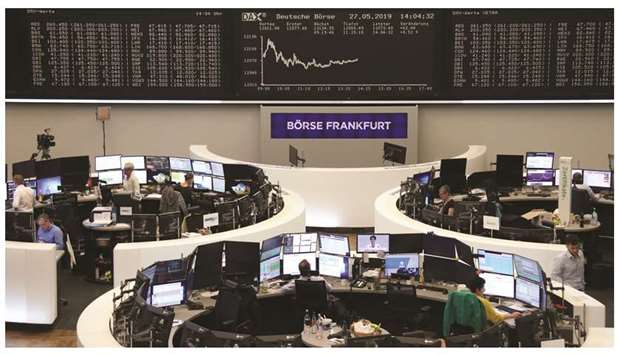European markets pushed higher yesterday, relieved that centrists remain in control in the European parliament following a bloc-wide election, while the chance of a big merger in the auto industry also sparked confidence.
A positive statement on US-China trade talks from President Donald Trump added to the positive vibe, dealers said.
With equity markets in the US and UK closed yesterday, the results of the European elections were in focus on continental European trading floors.
Frankfurt’s DAX 30 gained 0.5% to 12,071.18, Paris’s CAC 40 was up 0.4 % to 5,336.19 and Milan’s FTSE MIB lost 0.1% to 20,363.13 points at close yesterday.
Europe’s mainstream political parties took a hit in elections on Sunday but held off a strong surge by the populist right.
“No dramatic upset,” said Berenberg economist Holger Schmieding in a note to clients.
“As the four major pro-European mainstream parties fell merely from 70% to 67% of the seats, the European Parliament can continue to work smoothly,” he said.
While Marine Le Pen’s far-right National Rally (RN) finished top in France, pro-EU President Emmanuel Macron’s centrist alliance was close behind.
“The catastrophe that some people predicted for Macron has not taken place and the RN has a significant score, but not a spectacular one,” analyst Zaki Laidi from the Cevipof political institute said.
Both the Paris and Milan exchanges benefited from strong gains in Fiat and Renault shares after a merger offer by Italian-US auto giant Fiat Chrysler to France’s Renault yesterday that would create the world’s third largest automaker.
Milan still closed a touch lower, mainly because of fears that the government in Rome is back on a collision course with the EU over its budget and tax policies.
Fiat Chrysler is widely seen as a latecomer to the electric vehicle market but does well in the US SUV and pick-up sectors.
Renault meanwhile has pushed ahead in electric cars but is relatively weak in North America so the two companies would be a good fit, experts said.
Fiat Chrysler shares accelerated to close eight % higher, while those in Renault were up by nearly 13% by the end of business.
Trump meanwhile spurred investor optimism by saying there was a “very good” chance of a deal with China as the world’s top two economies clash over their trade relationship.
“I think sometime in the future, China and the US will have a great trade deal and we look forward to that,” Trump said after talks in Tokyo with Japanese Prime Minister Shinzo Abe.
Asian markets made a tepid recovery yesterday, with Tokyo rising 0.3%, while Shanghai closed 1.4% higher.
But Hong Kong and Singapore each lost 0.2%.
The cautious recovery in Asia came after the Dow retreated for the fifth straight week, its longest losing streak since 2011.
Oil prices rebounded after suffering a sudden rout last week due to a surprise increase in US crude and gasoline inventories.
Despite the Opec output cap as well as US sanctions against Iran and Venezuela putting pressure on supplies, jitters over the US-China trade war have dampened future demand, keeping prices on the lower side.
Meanwhile, the euro struggled to cling on to gains yesterday as investor relief at limited success for eurosceptic parties in European parliamentary elections was offset by a decline in the share of seats held by the biggest blocs.
Centre-right and centre-left blocs lost their shared majority, but surges by the Greens and liberals meant parties committed to strengthening the union held on to two thirds of seats, official projections showed.
The single currency initially rose as high as $1.1215, off two-year lows of $1.1105 touched on Thursday.
But it later fell to stand 0.1% down at $1.1197 in subdued trading because of market holidays in London and New York.
“If anything, it was positive that the populists didn’t gain more than they did,” said Christin Tuxen, an FX analyst at Danske bank.
The euro did hold on to gains against the Swiss franc and was last up 0.3% at 1.1256 francs.
The election results dented the hopes of anti-immigration, anti-Brussels parties, including those in France and Italy, despite topping the polls in their respective countries.
Tuxen said the election, normally of limited interest to global markets, was the first of a series of meaningful political events in europe this year, though signs of slowing economic momentum mean that monetary policy still matters more.
“What is really going on in the FX market is we are waiting to hear if there will be a Fed (US Federal Reserve) reaction to the deteriorating cyclical outlook,” Tuxen said, pointing to rising expectations of a cut to US interest rates later this year.
The dollar index rose 0.1% to 97.705.

The German share price index DAX graph is seen at the Frankfurt Stock Exchange. The DAX 30 gained 0.5% to 12,071.18 points yesterday.
